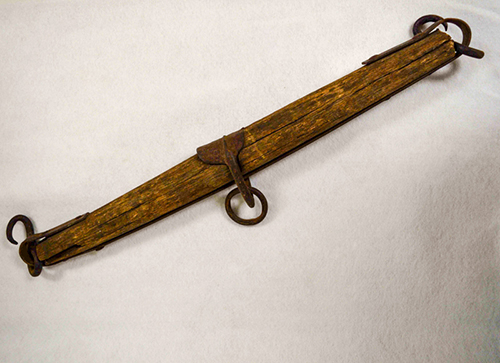
“When I look back, and I look at how I grew up, I have to start with where I grew up. And I grew up in an all‐Black farming community”
Calvin was born the third of seven children that grew up in Mount Calm, a small farming community in Louisiana that was made up of the descendants of freed slaves.
To show you how close knit it was, no one in my community where I was growing up was allowed to court or marry within the community. Everyone was related. Everybody had to marry outside – otherwise you’d be marrying your second or your third cousin.
Calvin’s father expected the children to do their share of work on the farm. As Calvin had a particularly well‐developed work ethic, he was oen charged with the plow.
People used to say to my father, ‘Why don’t you get a tractor?’ And he’d say, ‘I don’t need to – I’ve got my boys.’
The plow would be attached to two mules with leather straps fastened to the tool on display here, called a “singletree.”
This is the type of singletree that was used by my grandfather, my father, my grandfather on my mother’s side ... This is the type that was used going all the way back to the emancipation of slaves.
The family farm was 26 acres. They grew eggplant, tomatoes, cucumbers, watermelon, squash, cantaloupes, peanuts, cabbage, turnips, mustards, collards, and more.
You almost name it, we raised it. Growing up in an isolated farming community during that time, we basically raised 99% of what we ate. We also raised nearly everything our animals ate.
Calvin got up early to complete his chores on the farm before going to school. The bus would pass by an all‐white school and take him to a neighboring community, where there was a school for Black students.
You get up and have work to do before you went to school. Come in, wash up, get ready for school, and catch a bus, about 6:30 if you’re gonna ride a far as we went.
While these circumstances may have been difficult, Calvin does not encourage a sympathetic reaction, as his upbringing was in many respects a privileged one.
It sounds like my life was hard. But it was just life. And I got to enjoy some things most people never heard of. Like, you’ve never eaten a cushaw pie in your life. Matter of fact, you don’t even know what it is. And things like chinquapins? Most people never even heard of chenquapins.
Besides this, Calvin explains that the collective experiences of his youth gave him the foundation for who he is today.
To me, I am what I am because I was what I was. I am my history. All this stuff I did 45 years ago, 50 years ago, and I remember it because one who does not know his history does not know himself.
Calvin cautions against those who actively disconnect themselves from their roots.
I have always had what you might call a disdain in people who look back on their history and try to disconnect themselves from it. My thinking is, we should embrace our history. Because if we don’t embrace our history, we don’t begin to know ourselves. It’s very simple.